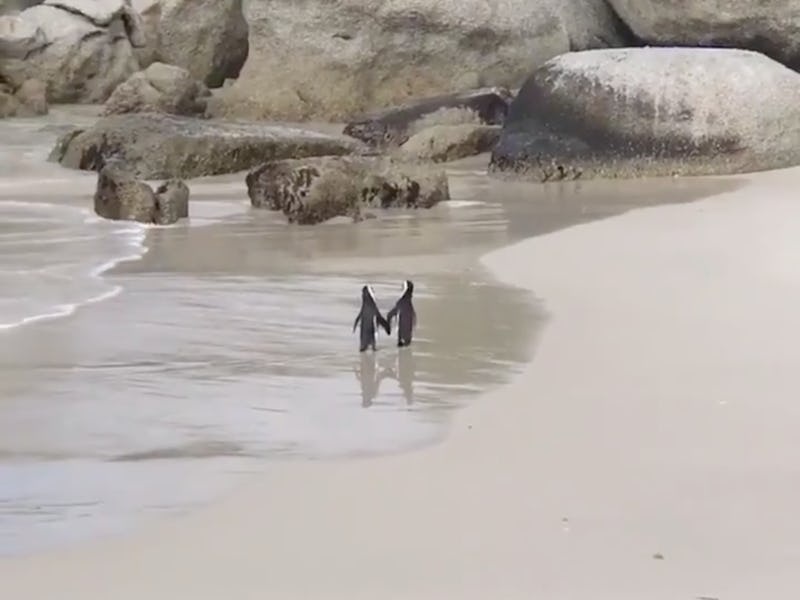Cute Video of Penguins Holding Hands Has a Surprising Scientific Reason
It's not just for show.

A video that shows two cute penguins strolling along the beach has gone viral, and it’s an ideal demonstration of pair bonding at work. The 16-second clip, shared by a Twitter user called “freakingdani” on Monday, shows two of the adorable birds flipper-in-flipper in South Africa. The tweet has already received over 100,000 likes.
Penguins are one of a number of species to form strong pair bonds to protect their young. When male and female penguins make an egg, they work together to care for the chick as it hatches. The process is brutal, with the males losing up to 50 percent of their fat supply over a period of four months as the pair endure long journeys to forage for food for the group, fighting bitterly cold temperatures. The time a couple spends together varies depending on the species: while most penguins do pair up again in the following annual mating season, Emperor and King penguins have notably high rates of breakup.
Penguin couples have been shown to exhibit incredibly human-like traits in their behavior. In fact, a Magellanic penguin couple spent 16 years together — nearly the entirety of their breeding life — a tale researcher Pablo Garcia Borboroglu described in 2012 as “incredible.” Most pairs in Borboroglu’s 30-year study lasted around five to 10 years until one of the penguins could no longer breed. In December 2011, photographer Silviu Ghetie captured stunning shots of hand-holding birds in Antarctica’s Port Lockroy that “looked like they were two lovers.” In March 2017, photographer Elmar Weiss found a similar hand-holding couple in the Falkland Islands.
Perhaps the secret to these long-lasting bonds is the process of leaving the nest and later returning. In the case of the Magellanic couple, both took solo trips that spanned nearly 200,000 miles, returning to the nest each year. In these patterns, the female normally lays two eggs, and the couple takes turns to watch the egg while the other swims up to 100 miles per day to collect food. Researcher Jean-Baptiste Thiebot, who found similar behavior in southern rockhopper penguins in 2015, said that “in these extremely faithful animals — the pair bonds for breeding may last all life long in this species — the partners may actually be separated by hundreds to thousands of kilometers at sea.”
Whether this pair will stay close remains to be seen, but if science is anything to go by, the odds are good that the pair will stay close over time.